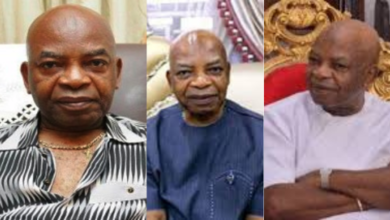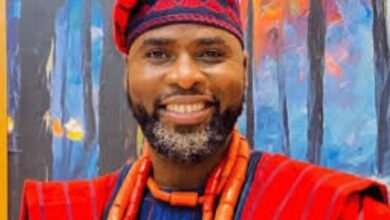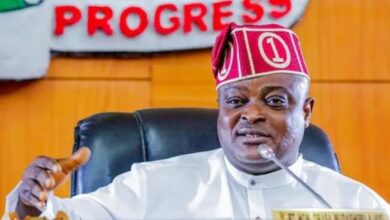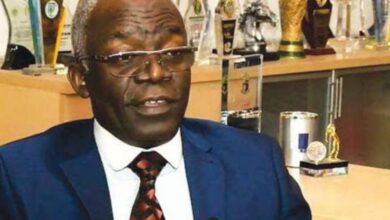Sir Siminalayi Fubara: The Rise, Fall, Controversial Suspension and the Future
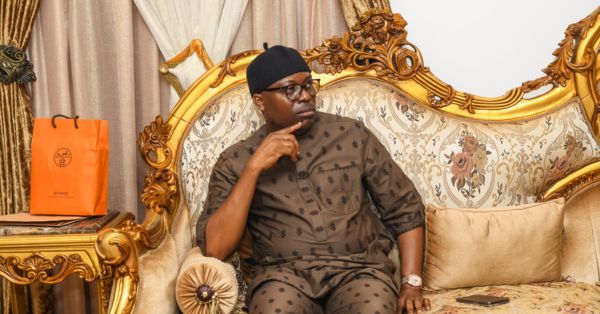
Sir Siminalayi Fubara: The Rise, Fall, Controversial Suspension and Future – Politics in Nigeria is never short of drama, and the story of Sir Siminalayi Fubara, the suspended Governor of Rivers State, is one for the books.
From his humble beginnings in Opobo Town to becoming the Accountant General of Rivers State and later its governor, Fubara’s career trajectory was one of steady ascension—until it all came crashing down in March 2025.
President Bola Tinubu’s declaration of a state of emergency in Rivers State and the subsequent suspension of Fubara, his deputy, and the entire state assembly sent shockwaves across Nigeria. But who is Siminalayi Fubara? How did an accomplished accountant and technocrat find himself at the center of one of Nigeria’s biggest political crises?
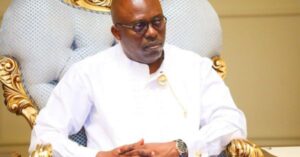
This article dives deep into his early life, career, political rise, controversial suspension, and the legal battle that could redefine Nigeria’s constitutional democracy.
Early Life and Education: The Making of a Technocrat
Born on January 28, 1975, in Opobo Town, Rivers State, Siminalayi Fubara was the second of five children and the first son of Joseph Fubara, a former soldier, and Love Fubara, a civil servant.
His educational journey began at Opobo Primary School, followed by Comprehensive Secondary School, Opobo. He then pursued a degree in Accountancy at the Rivers State University of Science and Technology, setting the foundation for his future in finance and governance.
Not one to stop learning, Fubara later obtained an MBA and an MSc from the University of Port Harcourt in 2013 and 2016, respectively. His academic credentials positioned him as a technocrat—a professional who would later transition into politics.
Career: From Accountant to Accountant-General
Fubara’s career began in 2003 as a Principal Accountant with the Rivers State Senior Secondary Schools Board. His financial acumen quickly earned him promotions, and by 2015, he had risen to Director of Finance and Accounts at the Government House.
In March 2020, he became a Permanent Secretary, and by December 2020, he was appointed Accountant General of Rivers State—a role he held until May 2022, when he resigned to pursue his governorship ambition.
His professional excellence earned him fellowships in:
- Nigerian Institute of Management (NIM)
- Association of National Accountants of Nigeria (ANAN)
But his transition from accounting to politics would soon test his leadership in ways he may not have anticipated.
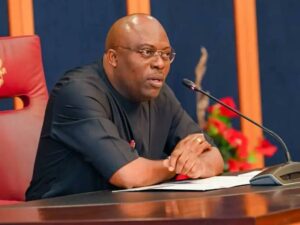
Political Ascent: Becoming Governor of Rivers State
Fubara’s political journey took a decisive turn when he won the Peoples Democratic Party (PDP) primaries in May 2022 and later emerged as the Governor of Rivers State in 2023.
As governor, he wasted no time initiating key projects, the most notable being the N195.3 billion Port Harcourt Ring Road project, awarded to Julius Berger. The project, designed to traverse six local government areas, aimed to decongest Port Harcourt and boost economic activity.
Fubara’s administration committed to paying over N150 billion upfront, signaling his determination to deliver infrastructural development. But while his policies showed promise, political instability loomed in the background.
The Suspension: A State of Emergency and Constitutional Crisis
On March 18, 2025, President Bola Tinubu made a historic announcement:
“By this declaration, the Governor of Rivers State, Mr. Siminalayi Fubara, his deputy, Mrs. Ngozi Odu, and all elected members of the House of Assembly of Rivers State are hereby suspended for an initial period of six months.”
The president cited “intense political instability” and a “paralysis of governance” as reasons for invoking Section 305 of the Nigerian Constitution, which allows for a state of emergency.
Tinubu appointed former Chief of Naval Staff, Ibok Ekwe Ibas, as Sole Administrator to oversee the state during the suspension.
Read: What You Should Know About Femi Falana, SAN
The Legal Battle: Can a President Remove an Elected Governor?
The suspension triggered an immediate backlash. Seven PDP-led states filed a lawsuit at the Supreme Court, arguing that Tinubu overstepped his constitutional powers.
Their key arguments:
- No constitutional provision allows the president to suspend a democratically elected governor.
- The National Assembly’s approval of the emergency rule was invalid.
- Appointing a sole administrator undermines democratic governance.
Legal experts say this case could set a precedent—since Nigeria’s 1999 Constitution has never been tested on this matter before. If the Supreme Court rules in favor of the plaintiffs, it could reinforce state autonomy. If it sides with Tinubu, it may expand presidential powers during emergencies.
Controversies: The EFCC Scandals and Fraud Allegations
Long before his suspension, Fubara was no stranger to controversy. In May 2022, the Economic and Financial Crimes Commission (EFCC) declared him and 58 others wanted for:
- N435 billion fraud
- N117 billion fraud (alongside four other officials)
- Criminal conspiracy, money laundering, misappropriation of public funds, and abuse of office
While Fubara denied the allegations, they cast a long shadow over his administration, fueling speculation that his suspension was politically motivated.
Personal Life: The Man Behind the Office
Beyond politics, Sir Siminalayi Fubara is a man of deep personal roots. The first son in a family of five, he’s described by those who know him as humble, disciplined, and quietly principled.
He is a Knight of St. Christopher in the Anglican Church and holds the prestigious traditional title of Amaopu-Senibo in his native Opobo Kingdom. He is married to Valerie Fubara, and they share three children.
Despite the firestorm engulfing his career, Fubara has maintained a stoic silence, letting his legal team and political allies do the talking.
What Comes Next for Rivers State—and Fubara?
Sim Fubara’s suspension has triggered a constitutional showdown, a political reckoning, and a moral dilemma for Nigeria. Is he a victim of political witch-hunting? Or a flawed leader caught in a web of his own contradictions?
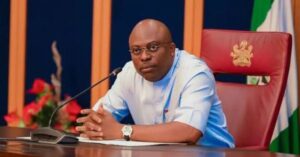
Regardless, one thing is certain: Rivers State is at a turning point. The courts must now decide not just the fate of a governor, but the future of democratic balance in Nigeria.
And for Fubara, the fight is far from over.
Conclusion: What’s Next for Fubara and Rivers State?
Siminalayi Fubara’s story is one of rapid rise, sudden fall, and legal uncertainty. His suspension raises critical questions about Nigeria’s democracy:
- How much power should a president wield during a crisis?
- Can state governments challenge federal overreach?
- Will the Supreme Court’s decision redefine constitutional limits?
As the legal battle unfolds, one thing is clear: Nigeria’s political landscape is evolving, and the outcome of this case could shape governance for decades to come.
For now, Rivers State remains under emergency rule, Fubara’s political future hangs in the balance, and the nation watches closely.


